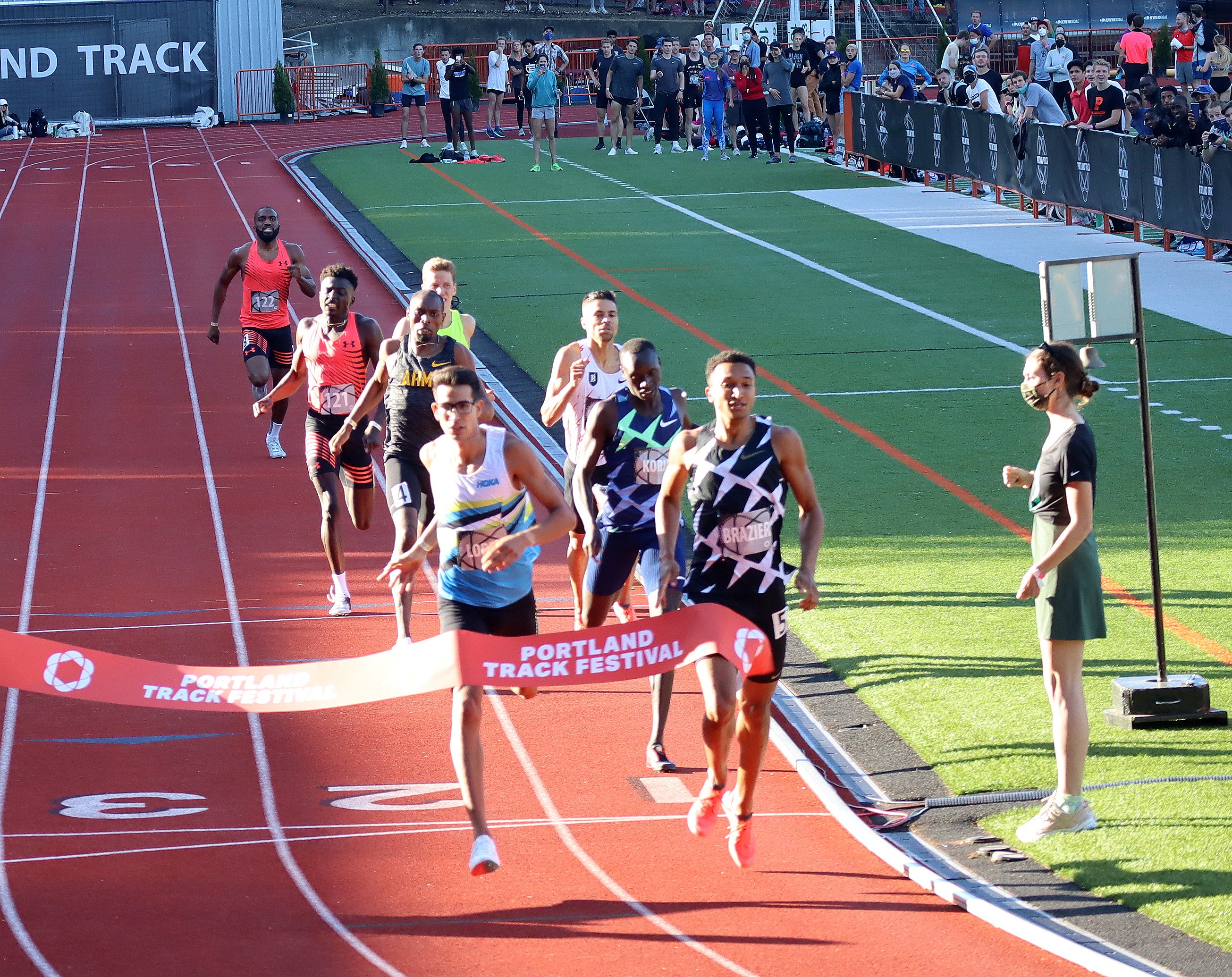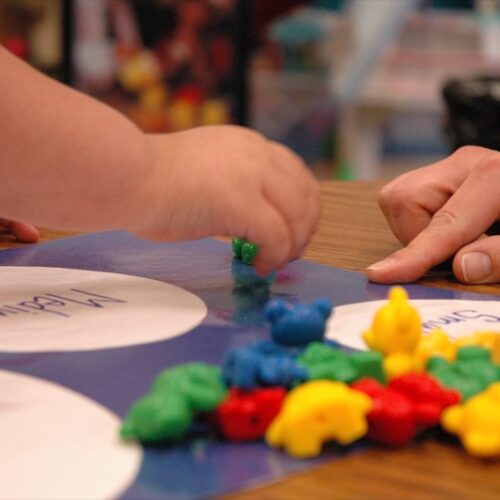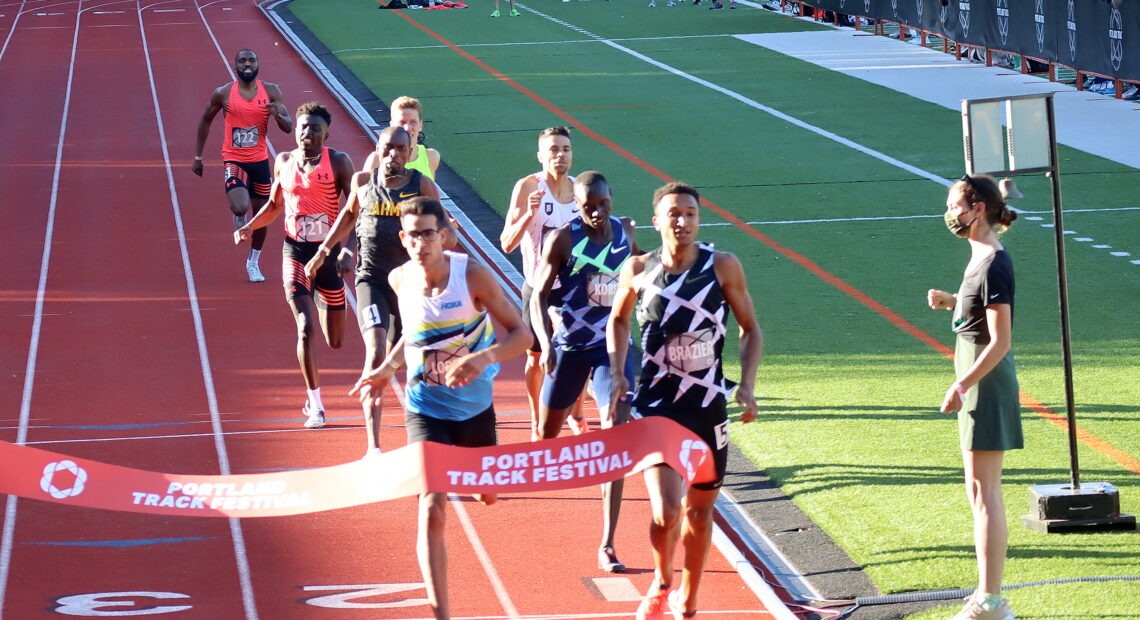
Big Names In Northwest Running Bow Out Of Olympic Team Trials, Creating Room For New Stars
READ ON
Some of the biggest names in American running have bowed out of the U.S. Olympic Track and Field Team Trials as the 10-day competition moves into the starting blocks in Eugene. The scratches open a lane for a new generation of stars to earn spots in the delayed Tokyo Olympics.
In quick succession earlier this week, steeplechase medalist Evan Jager of Portland, three-time Olympian Shannon Rowbury, who also trains in Portland, and 10,000 meter American record holder Molly Huddle announced their withdrawals from the 2021 Olympic Trials.
In an Instagram video, Jager said he is still struggling to recover from Achilles inflammation and tightness and pain in his calf. Rowbury, a 1500 meter specialist, said a stress fracture would keep her out of the trials. Huddle said nagging hip and ankle injuries caused her to pull out.
The biggest shocker though for the local and national running community was the disclosure Monday that anti-doping officials have banned top U.S. middle distance runner Shelby Houlihan from competition for four years. The Beaverton-based Nike Bowerman Track Club star tested positive for the steroid nandrolone.
Houlihan and her coaches protested her innocence during an emotional news conference in which they blamed the positive test result on a contaminated burrito purchased from a Beaverton food truck. Her attorneys are pursuing an appeal of the disciplinary sanction in the Swiss court system, which has jurisdiction over international sports.
When the running, throwing and jumping begins Friday to select the Tokyo-bound U.S. Olympic track team, a pack of younger athletes will have a chance to seize the limelight. Some veterans are still around, such as sprinter Allyson Felix who is aiming for her fifth Olympics. But marquee events such as the 100 meter dash, half mile and women’s 5000 meters could mint all brand new Olympians.
“It’s been a lot of anxiousness, a lot of anxiety — slash, eagerness — leading up to these trials,” said 800 meter favorite Donavan Brazier, who trains at the Nike headquarters in Beaverton. “Now that we know it is happening — the trials are actually here — the closer we get, the more surreal it feels.”
If he makes the team, the 24-year-old Brazier would punch his ticket to his first Olympics, rescheduled to this summer, a year later than originally planned because of the pandemic.
Overcoming adversity… and actual hurdles on the track
The storylines for the team selection meet at the new Hayward Field on the University of Oregon campus include several Olympic hopefuls who are staging comebacks from adversity. University of Oregon alum English Gardner contracted COVID-19 in late April and was sidelined for about a month. Speaking to reporters during a virtual press conference Tuesday, the sprinter said she hadn’t felt like a normal person again until this week.
“I feel confident going into the trials this week because I have nothing to lose and everything to gain,” Gardner said. “I’ve already beaten COVID. I feel like a conqueror. So, this week will definitely just make me more than a conqueror.”
Gardner is entered in the women’s 100 meter dash, which begins with prelims on Friday and ends in a prime-time final on Saturday. Gardner also wanted to race the 200 meters at the trials, but her qualifying time wasn’t fast enough.
Steeplechase hopeful Allie Ostrander of the Seattle-based Brooks Beasts Track Club is trying to overcome a major training disruption of a different sort. In a YouTube video she posted on June 11, the pro runner with a large social media following revealed she entered a partial hospitalization program for intensive eating disorder treatment earlier this spring.
Ostrander said seeking treatment wasn’t her idea. She was pushed by her coach, her corporate sponsor and doctors at the U.S. track and field federation.
“I was pretty much told, ‘Do this or you get dropped,'” Ostrander said.
In retrospect, “I am super thankful to Brooks and USATF for being so supportive through this process and even helping to cover some of the financial strain,” she said.
Ostrander said she made a public video about her story in hopes that it would help “shed some light on the severity and prevalence of eating disorders,” and maybe even inspire a few people to take on their own recovery. Ostrander steps to the start line for the first round of the 3000 meter steeplechase on Sunday.
Once more with feeling for a converted triathlete
The 2021 Olympic Trials will offer an acid test for a decorated triathlete who converted to pure distance running. Professional athlete Gwen Jorgensen competed in triathlon at two prior Olympics, winning Team USA’s first gold medal in the event at the 2016 Rio Games. In the latter half of 2017, she gave birth to a baby son, then announced her retirement from triathlon, and moved from the Midwest to Portland to join the Bowerman Track Club pro training group.
“Retirement” initially meant transitioning to marathoning. But when a difficult recovery from heel surgery kept Jorgensen out of the 2020 U.S. Olympic Marathon Team Trials, she refocused on this month’s track and field trials. Jorgensen is entered in both the 5000 and 10,000 meter events where her qualifying times put her in the middle of the running packs.
Marathoner crashes the 10,000 meter party
The men’s 10,000 meter race on Friday will feature a familiar face in three-time Olympian Galen Rupp, even though the Portland native has evinced no intention to compete in that event at the Tokyo Games. Rupp has already qualified for the upcoming Summer Olympics in the marathon. He told OregonLive in late May that he would treat the Olympic Trials 10K as a rigorous training run. The Oregon Duck alum also spoke of wanting to step back onto Hayward Field, which received a $200 million makeover since he and other running champions last competed there.
Weather could create a suffer fest for distance runners
Hot weather in the forecast for the first weekend of the Olympic Trials in Eugene could become a factor in distance running events. Sprinters rarely complain about hot weather as the heat keeps their bodies warm and loose. But the women’s 5000 meter final on Monday afternoon could devolve into an epic suffer fest given the event involves 12-and-a-half laps around the track amid temperatures predicted to top out at 96 degrees.
The men’s 10,000 meter race on Friday and a decathlon 1500 meter run on Sunday may escape the worst of the heat wave by not starting until 7:25 p.m., but those too could still be toasty. Then again, hot and humid also describes the outlook for Tokyo in late July/early August.
“I went to Texas A&M, so I personally love the heat,” said half-miler Brazier. “I’ve been complaining out here in Portland for the past six months about how crappy the weather is, so I’m not going to start complaining now that it’s too hot.”
Conveniently, Brazier’s 800 meter final is scheduled in the hot Monday afternoon sun.
Related Stories:
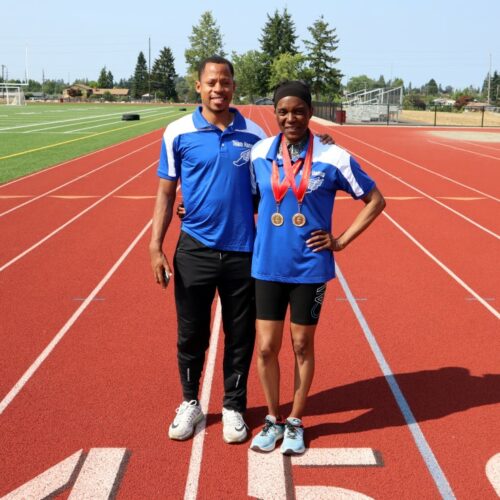
Across 41 Year Age Gap, An Olympic Hopeful And A Senior Games Champ Have Partnership That Sprints
Not every Olympic story is happening in Tokyo this week. Take for instance two runners in Tacoma.
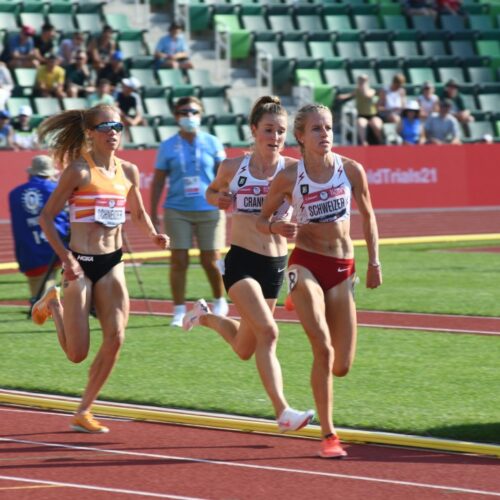
‘Dangerously Hot’ Temps Force Schedule Changes At Olympic Trials In Eugene
The broiling heat in the weekend forecast is forcing changes at the U.S. Olympic Track and Field Team Trials underway in Eugene. Distance races are being shifted earlier in the day, but shorter events are staying put on the schedule in the peak afternoon heat.
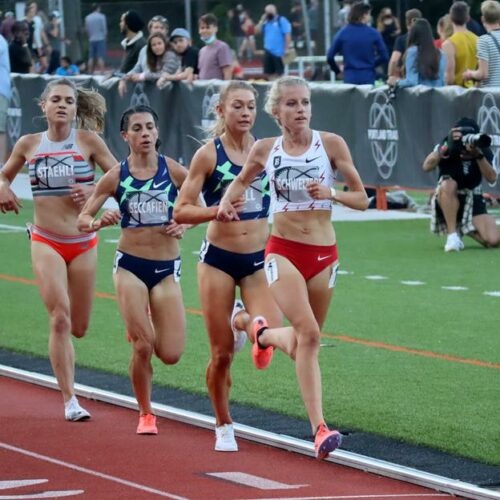
Olympians Made Here: Northwest Training Groups Stocking Tokyo-Bound Teams With Top Runners
The Northwest is famous for churning out jet airliners, computer software and huckleberry syrup. The U.S. Olympic Track and Field Team Trials beginning June 18 in Eugene will showcase another local product: Olympic distance runners.

